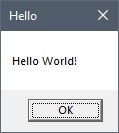Been playing around with Zig, which is a new language that is still in beta for the most part, but is pretty well polished already, and can be used as a drop-in replacement compiler/linker for C/C++. Home ⚡ Zig Programming Language (ziglang.org)
The syntax highlighting below may be a bit drab, but C++ seemed to be the closest option in the plugin being used.
const std = @import("std");
const print = std.debug.print;
pub fn main() !void {
for (1..1001) |counter_value| {
for (1..1001) |counter_value2| {
print("Value1 = {} and Value2 = {}\r", .{ counter_value, counter_value2 });
}
}
print("\n", .{});
}
Code language: C++ (cpp)const std = @import("std");
const print = std.debug.print;
pub fn main() !void {
var counter_value: u32 = 0;
while (counter_value <= 10000) : (counter_value += 1) {
var counter_value2: u32 = 0;
while (counter_value2 <= 10000) : (counter_value2 += 1) {
print("Value1 = {} and Value2 = {}\r", .{ counter_value, counter_value2 });
}
}
print("\n", .{});
}
Code language: C++ (cpp)